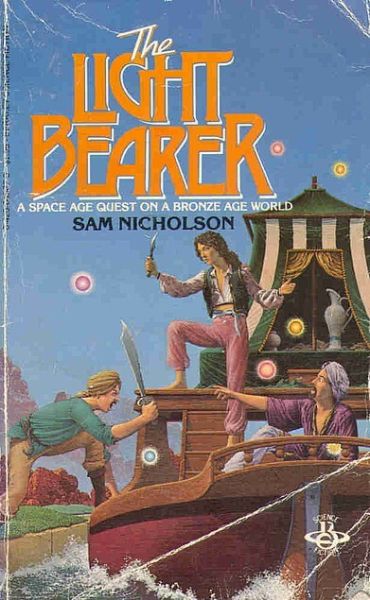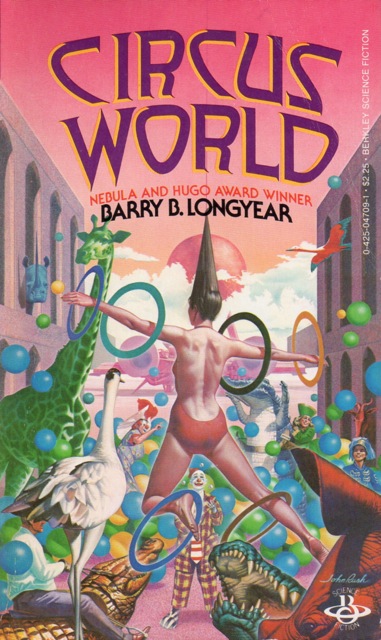Born on a Pirate Ship
The Light Bearer
By Sam Nicholson

4 Apr, 2021
Sam Nicholson’s 1980 The Light Bearer is a standalone science fiction novel. It was Nicholson’s only novel and as far as I can tell, this was its only edition in any form.
Sam Nicholson is a pseudonym; the author is said to have been a certain Shirley Nikolaisen, about whom we know almost nothing. We don’t know why she stopped writing.
Stumbling over a planet populated by Bronze Age primitives, the so-called Space Givers saw only a world of rustics who would no doubt be overjoyed to be raised up to the galactic level. In short order the Space Givers discovered that the locals saw them not as paragons to be emulated but as sheep to be shorn. Having retreated to their orbital complex, the Space Givers embarked on a lengthy attempt to gradually civilize a world that considered Space Giver ideals laughable at best.
Many years later, at the great city of Mus-al-ram, Zeid the Light-Bringer offers the Space Givers hope that their project is finally bearing fruit.
It is the custom of the Space Givers to take young aristocrats to their orbiting Moonship to offer gifts to the youths. Most of the visitors demand various useful trinkets. Zeid was an anomaly: he didn’t want things, he wanted to understand how technology worked. Educated in the manner of a Space Giver, he returned to his world to do good works, while attempting to philosophically uplift a planet of cynical pragmatists. He is widely respected but his efforts to improve his world have had little effect.
One popular Space Giver gift is parthogen bottles, which, given a biological sample, can manufacture human duplicates. Zeid’s wizard father and his competitors use the bottles to manufacture beautiful women for harems. They’ve set their sights on Fire Lotus, free princess of the Milk White Quarries; she is exquisitely beautiful. If they can convince her to donate a sample, they could rake in millions for lovely slaves. Zeid is dispatched to negotiate with the princess.
Zeid is not averse to this mission. His brother Rustad, ever protective of his own position and wealth, sees Zeid as a potential threat. Distance could help Rustad forget about Zeid for a while or at least limit the number of assassination attempts. More importantly, Zeid is certain Fire Lotus must have a mind as pure as her body is beautiful. Therefore, he is determined to win the heart of this paragon of virtue.
Zeid’s mission is complicated by the presence of Coral Bud, a pirate princess whose father has assigned her the task of marrying Zeid. She sees no need for Zeid to complicate his household with a second wife. Zeid for his part thinks he has some say in who he will marry once Coral Bud has set her sights on him1. This is but one subject in which the fiercely practical woman will school the idealist.
Enter Feelafell, Space Bastard! The product of an illicit affair between spacer and local, he combines vast resources with grand ambition and scant ethics. The would-be conqueror has set his sights on Coral Bud as his future bride. It is a bold scheme that requires getting his hands on Coral Bud while removing the impediment of her reluctant fiancé, Zeid.
~oOo~
One might expect a novel of this vintage to limit the feisty woman co-lead to roles such as kidnap victim, and eventual reward for Zeid. While Coral Bud is briefly kidnapped, her captor quickly discovers that proximity to Coral Bud vastly increases her opportunities to hurt him. As far as Coral Bud is concerned, Zeid is her reward, one the extraordinarily stabby woman plans to earn by keeping him alive.
Zeid and his people are humans. Obviously, because otherwise there could be no Feelafell, Space Bastard. As far as I can tell, the novel never explains how a planet came to be populated with Bronze Age humans. Lost colony, perhaps? The book also doesn’t bother explaining how it is a Bronze Age planet came to be a setting right out of the Arabian Nights2. Maybe the planet is a fallen theme park3?
Not to praise with faint damns, but having reread the same author’s Captain Empericalnot so long ago, this novel wasn’t as dire as I expected. In fact, swathes of it seem to be setting up stock Analog tropes, only to partially undermine them. That is not to say that this is a good novel, but at least it was surprising.
There are some off-handed comments about the Space Givers being smarter, but on closer examination they are not smarter, just more sophisticated in matters of technology and philosophy (while being very deficient in matters of style and art). Curiously for an author published in Analog, which as you know ran editorials defending slavery, Nicholson comes down firmly against slavery, as economically inefficient4. There are also references to rioting beggars; it turns out that aside from the occasional person whose business model is dependent on maiming kids before sending them out to beg, most of the people in the beggar class are perfectly content to work for their living, were they given work. That’s not what I expected from a vintage Analog author5.
In fact, had the author’s pseudonym not been on the cover, I might never have guessed that this was the same person who wrote the Captain Emperical stories. It may not be one of the great works of SF, but it’s better than the author’s Analogstories. One wonders how the author would have developed, given more works in which to hone their craft? But that was not to be.
The Light Bearer is out of print.
1: The key to resolving the Fire Lotus matter turns out to be allowing Zeid to actually converse with Fire Lotus, who turns out to be very much a product of her time and class.
2: Note that the setting of the Arabian Nights is way way later than the Bronze Age. It’s unsettling that the author describes the planet as Bronze Age but models her society on something much later.
3: Re fallen theme parks: yes, I do need to find time to review Barry Longyear’s Circus World.

4: For the economy as a whole. The slave owners only care about their particular part of the economy. For the most part they are don’t believe that free workers would work harder than slaves and do prefer workers who cannot quit if working conditions are dire.
As it turns out, the person who introduces democracy to this nameless world is not idealistic Zeid, but Coral Bud’s father, who discovered his pirates are more invested in his fleet’s activities if they have a say in how the fleet is administered. Too bad their economy is based on taking other people’s stuff. Perhaps this is why the reader is informed in passing that these particular pirates target other pirates on their way home from looting ships. Goood pirates.
5: Not to mention the absence of the usual vintage SF argument that any suffering on the path between Bronze and Space Age is necessary for progress and good for the survivors. Indeed, one of Feid’s projects is teaching people the value of compassion.
